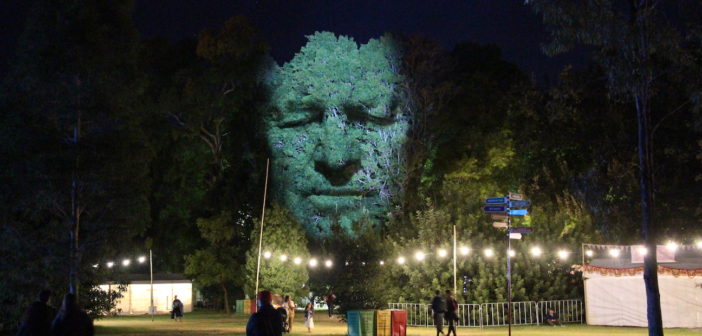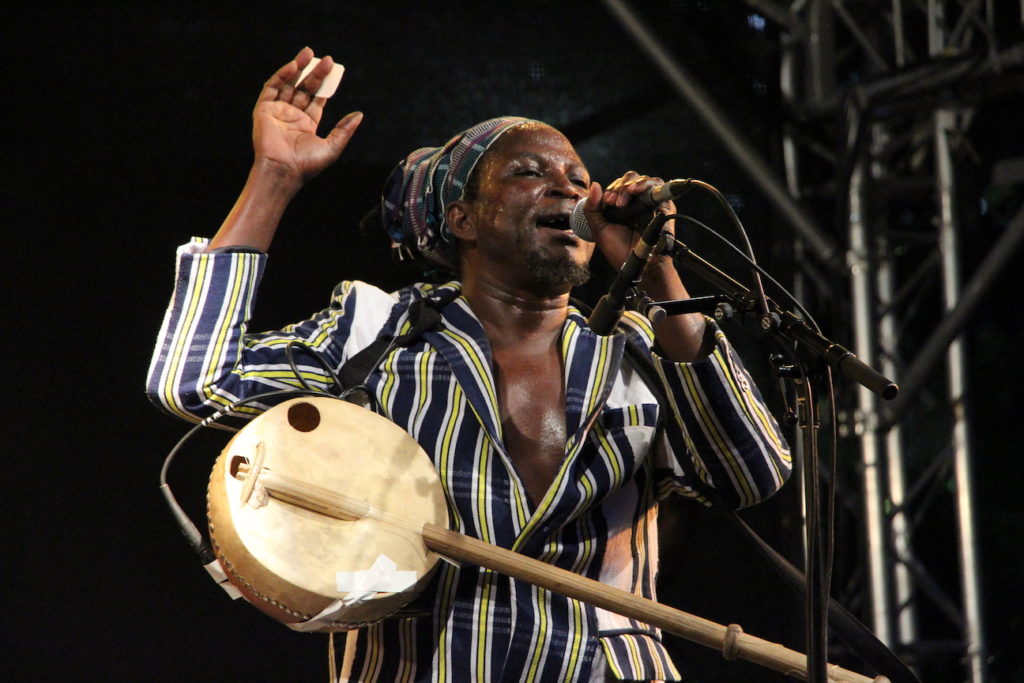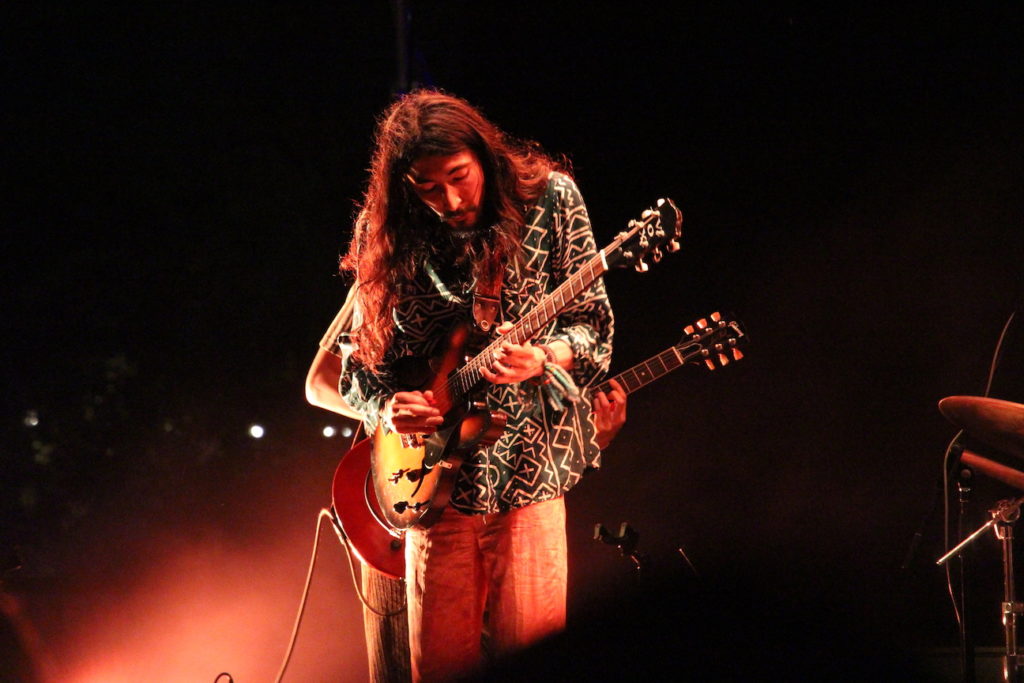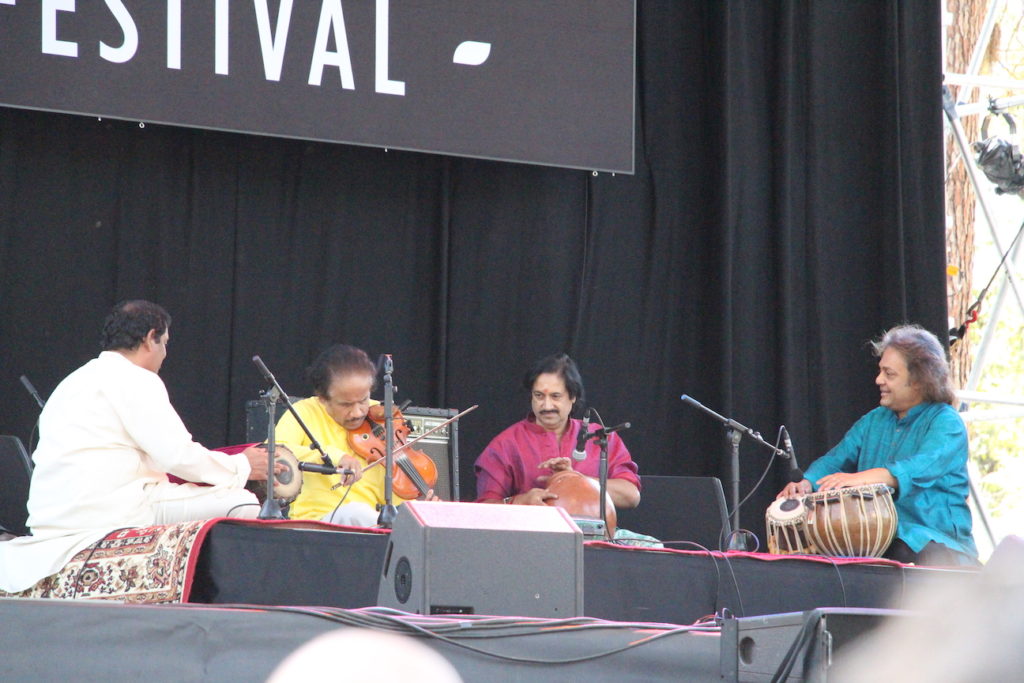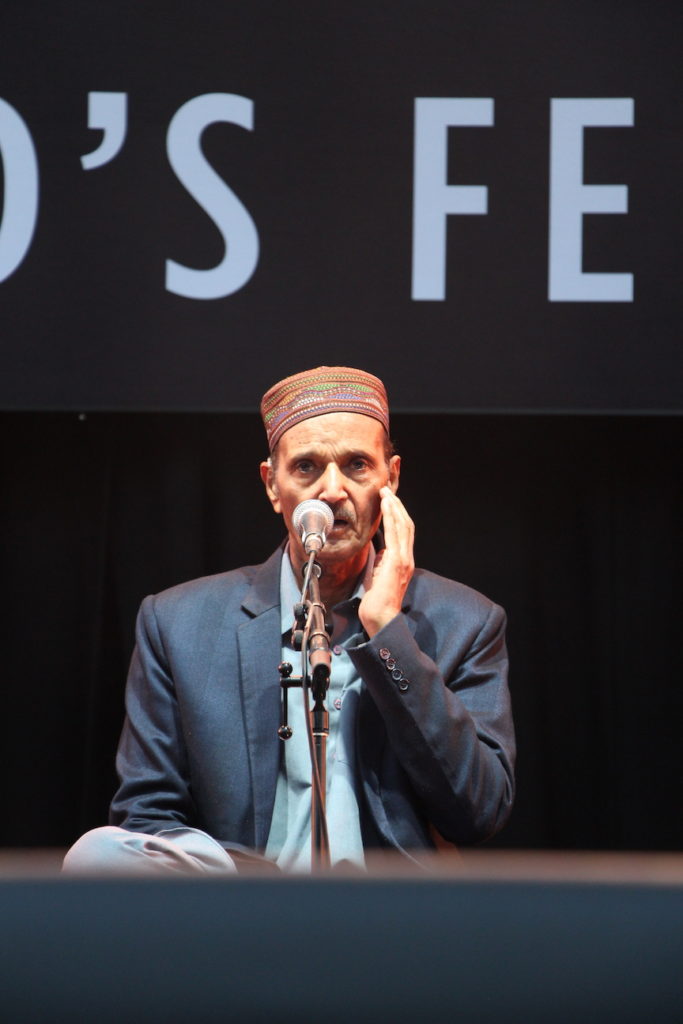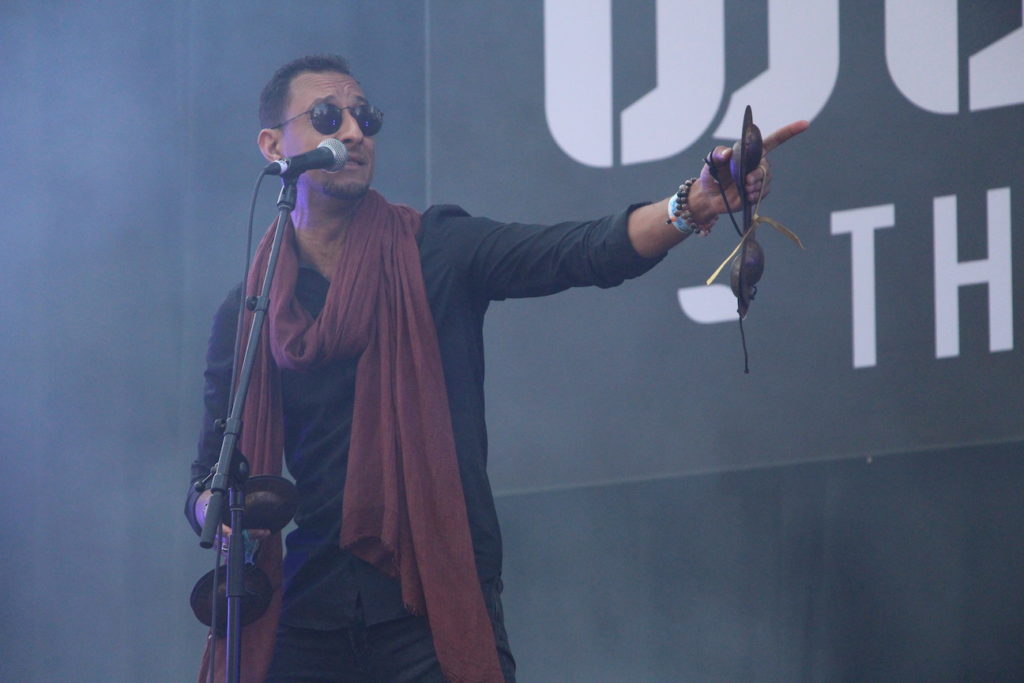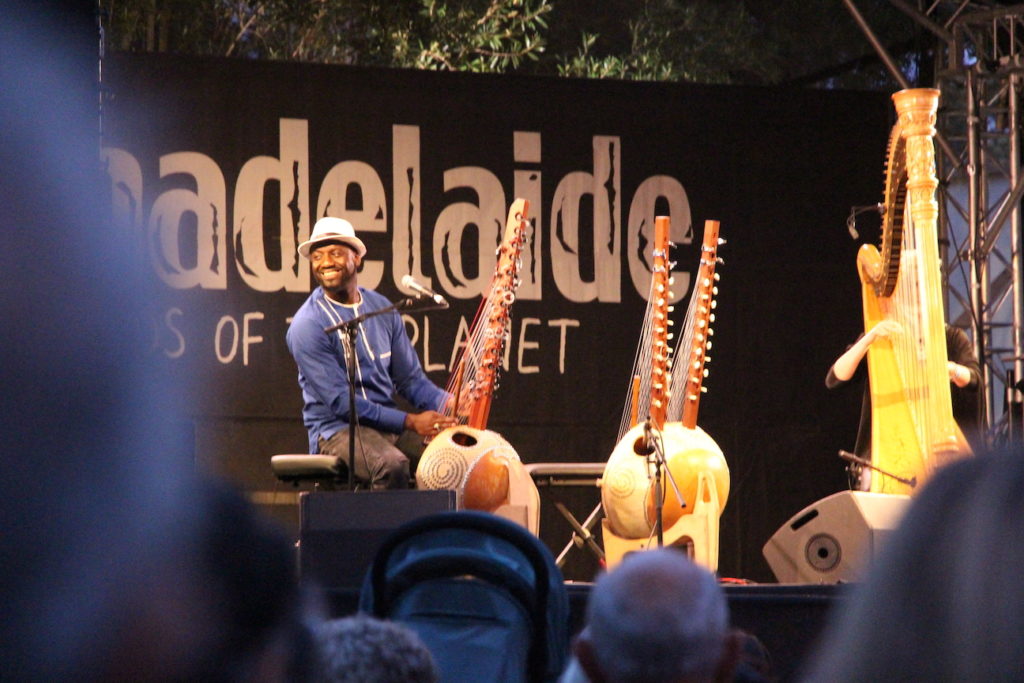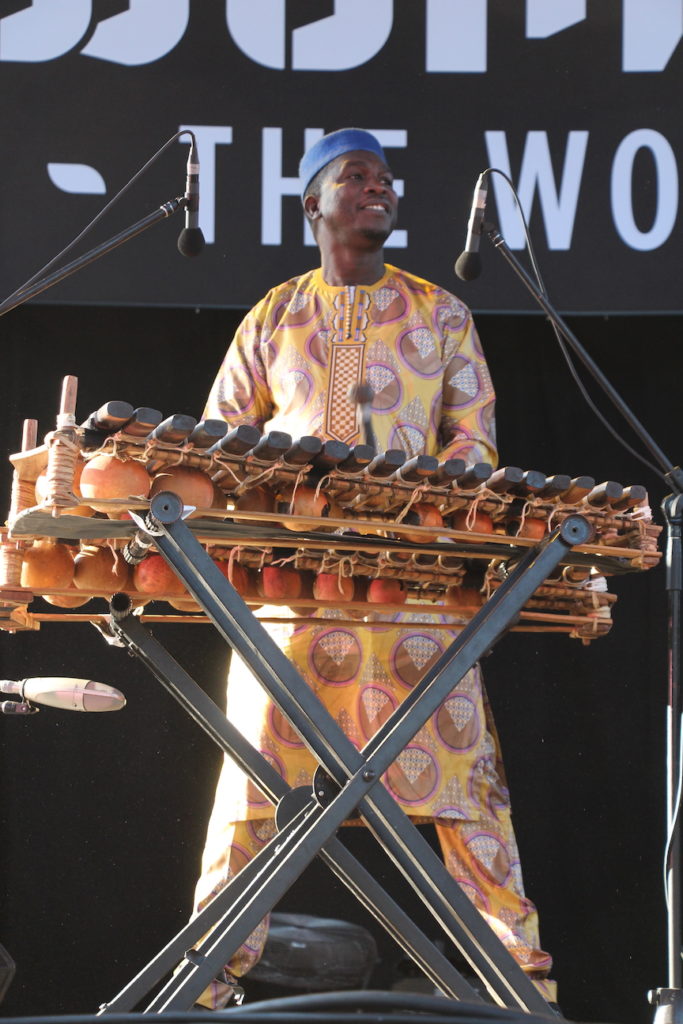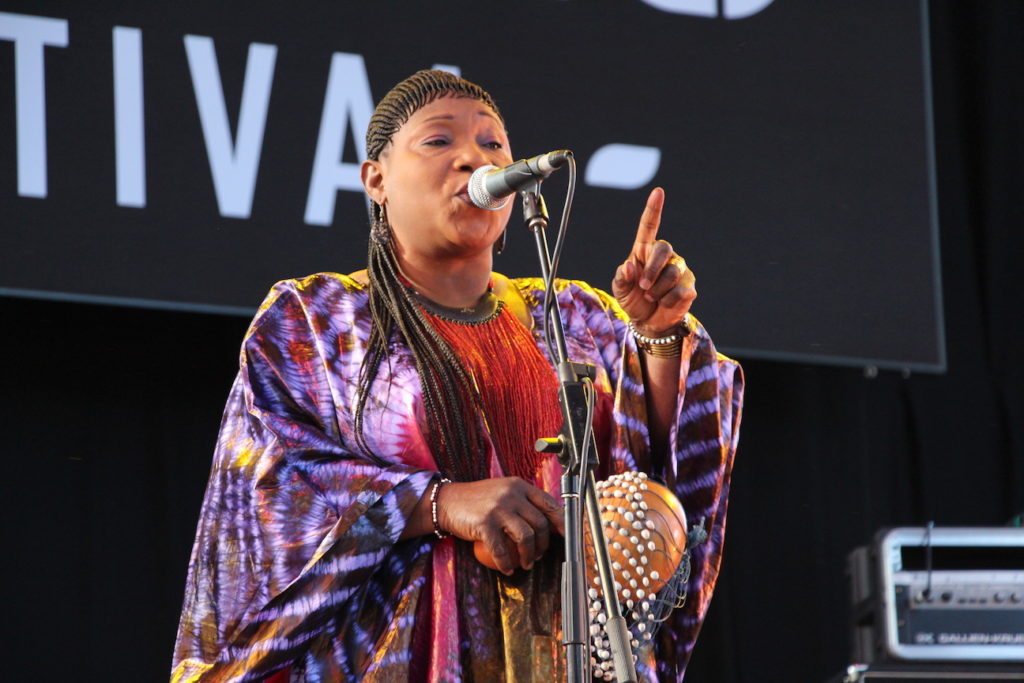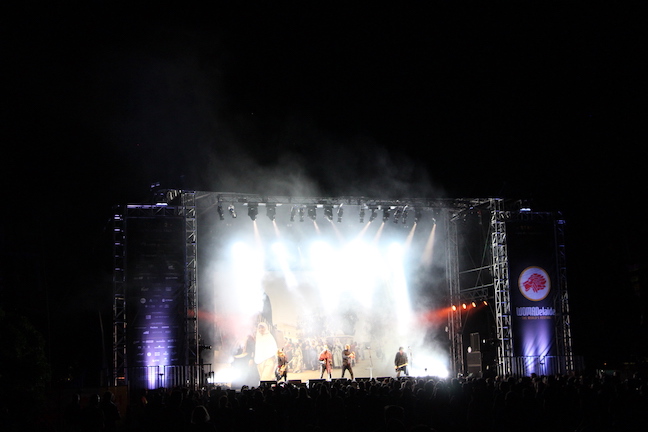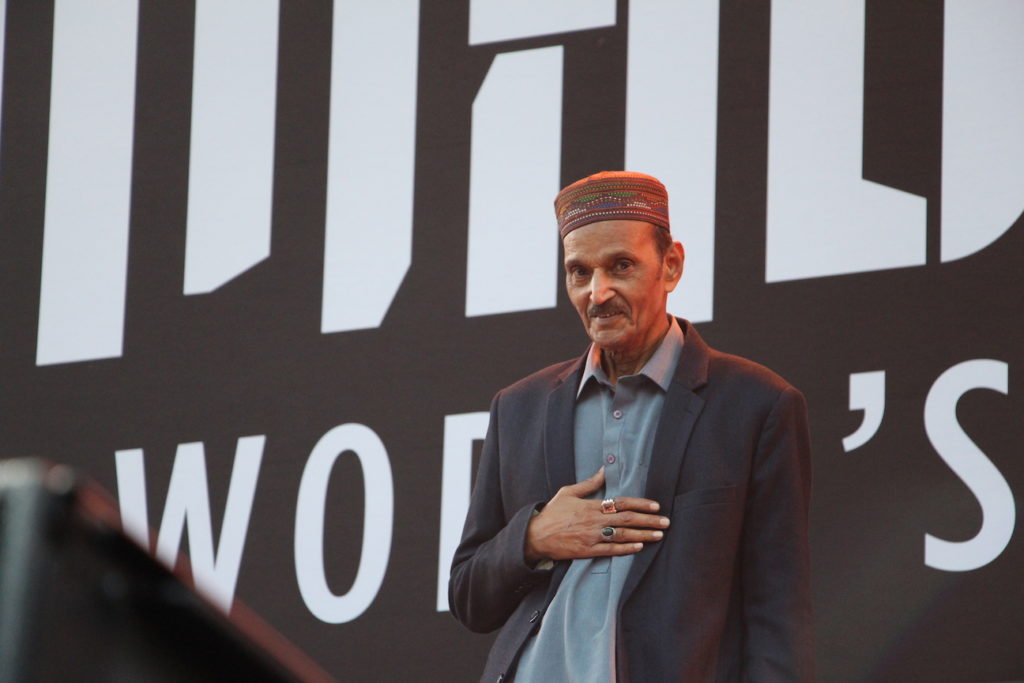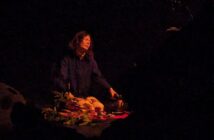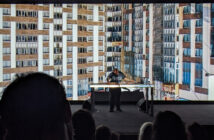Adelaide in mad March is when the traditionally sleepy city of churches awakes in a frenzy, with the Fringe Festival, Adelaide Arts Festival and Superloop Adelaide 500 (car racing) in quick succession. Yet traditionally a few of us (about 90,000 odd) forgo those pleasures for something more peaceful, and find an oasis within the chaos, an opportunity to feast on music, arts and culture from across the world in the Botanical Gardens at Womadelaide. The lineups are traditionally diverse, a mixture of established icons and newer less traditional acts, there’s the mainstream and the no stream, electronic, folk, rock, theatre and everything in between. Across 4 days and nights and eight stages we all curate our own festival. This was ours:
We began in Ghana with Kologo master (a 2 stringed lute) King Ayisoba and band, consisting of balafon (a marimba/xylophone), gourd percussion, shaker and hand drum. Even unaccompanied Ayisoba is able to generate an incredible percussion thump whilst strumming his unique instrument, yet the addition of the band provides the opportunity for extended rollicking jams. “Eat alone, die alone” grizzled Ayisoba cheerfully in one of his periodically English vocal pieces. It’s an incredible welcome to Womadelaide. Now we can breathe.
Tokyo’s Kikagaku Moyo appeared on Stage 7 (aka the bat stage – with hundreds of bats hanging off the trees and squawking madly during the performance). Their extended tripped out guitar/organ based psychedelia drew on elements as diverse as Tortoise, Stereolab and Neil Young. Oh, and they even had an electric sitar. Midway however something remarkable began to happen, perhaps the bad acid kicked in as they opened a peculiar lysergic dementia seeped gateway and it all made sense in a very wrong kind’ve way. The addition of a felt cowbell and (very) occasional low-key spooky vocals only enhanced matters.
Korea’s Kim So Ra is a remarkable percussionist. She plays the anggu (double-headed drum) with remarkable dexterity and control. Palpable too is her desire to share her cultural heritage of Jeongeup folk music from the Honam Province. From the taepyeongso (double reed wind instrument), to their double drum solo, Kim So Ra’s trio’s performance was one of those gifts from the Womadelaide gods where culture, tradition and musicianship collide to create something truly unique and memorable.
We began the following day arriving late for Indian L Subramaniam’s performance on the bat stage. It was a subdued scene. Taking a seat it was impossible not to get caught up in the virtuosic playing. “I’m not saying the words guinea pigs,” he laughed at one point “but I’ll try it and if you appreciate it I’ll go and record it.” We appreciated it and made a firm commitment to be on time for his Sunday night performance, which was nothing short of mesmerising.
To be honest we were pretty fearful of the next performance. A bizarre hyper maximalist collaboration between the post punk attitude soaked French guitar/bass duo and two dwellers of the Djerid desert of Tunisia. Together they performed their take on the Banga ritual of the region. There really is no precursor to the music of Ifriqiyya Electrique. Their two previous albums, 2017’s Rûwâhîne and last years Laylet el Booree, (Night of Madness) continue to confuse, disturb and intrigue in equal measure. And our interview a few weeks ago with founder François Cambuzat did nothing to change that. So here they are on stage 3 on a Saturday morning dressed in black, soaked in tude, screaming manically, shredding guitar, and banging castanets along to a backing track of immense chanting field recordings and industrial beats. It’s a big bombastic industrial sledgehammer that just pummelled and pummelled and pummelled. “You want the nice world music,” Cambuzat sneered at the end, “Fuck off! The world is a beast. What we are doing right now is a nice little choir of girls on recorder. Meshuggah, Birthday Party are nothing compared to what happens over there.”
One of the true highlights of the festival was the gorgeous interplay between UK classical harpist Catrin Finch and Senegalese kora player Seckou Keita. This was a collaboration in the true sense of the word, with each artist listening respectfully to the other, providing space for the other and building on the other’s performance. I’m pretty sure some of Finch’s moves didn’t come from her classical repertoire, but that’s what collaborating with another discipline is all about. “We thought we’d give Seckou something easy to learn, so we gave him a little piece by Bach called the Goldberg Variations,” offered Finch to much mirth. Everything about this performance made you feel good and the joyous sounds of the two harps, and two personalities from opposite ends of the earth weaving in and out of each other across the gardens was truly magical. We saw them twice. It wasn’t enough.
Ustad Saami is a 75 year old Pakastani singer who uses a long forgotten 49 note scale and released his debut album last year, the truly exceptional God Is Not A Terrorist. A few weeks ago we spoke with his producer Ian Brennam about recording the album, where he described the unprecedented level of control Saami exhibits and how he was initially drawn to the darkness in the work. Saami is a true master of a near forgotten art form and it’s truly remarkable that we are getting the opportunity to see him in Australia. Performing with his three sons, who would often accompany call and response, this was an incredibly affecting musical experience for all involved. Saami’s voice is not powerful, though it is precise. As he moves up and down his scale, motioning with his hand as he moves, it’s impossible not to marvel at his single minded dedication to the miniature, to the spaces between the notes that often get ignored. Earlier on in the day at Saami’s artist in conversation, Brennam mentioned that prior to this tour Saami had apparently been practicing from 4am to 12pm every day. It shows.
As it got later we found ourselves in the Frome Pavillion marvelling at the impossible cool of Melbourne’s So.Crates (producer/ beatmaker Skomes and MC Cazeaux O.S.L.O, a Californian born Melbourne resident). Their deep love of late 90’s soul, jazz and hip hop was the perfect vehicle for a late night boogaloo, and the kids were going crazy. We danced like idiots to their warm beats and old school hip hop, losing our shit to not one but two versions of Mama Danced On Soul Train. What a ridiculously catchy tune. We woke up with it firmly ensconced in our brains the next day and haven’t been able to get it out since.
Sunday began with Afrobeat aerobics from Melbourne’s Public Opinion Afrobeat Orchestra workshop before heading down to catch the Maloyan dance music of Reunion Island ensemble Destyn Maloya. Most of the Reunion music we’d seen in the past was a really curious yet difficult to pin down, a fascinating amalgamation of influences with a really strong percussion bent – usually with an incredible shaker that looks like a wooden cutting board. Destyn Maloya followed in these traditions but ramped it up, particularly when towards the end they jumped into the crowd.
We managed to get to an almost deserted bat stage stupidly early and were fortunate to catch Mali’s Trio Da Kali during soundcheck. The balafon (a marimba/ xylophone type instrument) player absent mindedly played this gorgeous low key lullaby, his attention elsewhere. When he finished we applauded. He looked up surprised, clearly wondering what he had been playing. Trio Da Kali, who have previously collaborated with Kronos Quartet are led by this incredible virtuosic player, accompanied by bass ngoni and vocals. Their music is gentle and controlled, the singer’s use of shaker was particularly tasteful. Songs could begin as dark bleak Malian blues before the introduction of a ridiculously happy and energetic balafon changes everything. This was possibly our favourite performance. Remarkable.
One rule we have at Womadelaide is always watch the theatre. This year we caught the UK’s Wired Ariel Theatre’s dramatic “As The World Tipped,” a climate change performance that took the notion of a tipping point literally as the Copenhagen climate change office dwellers fail to notice the world somewhat tilting around them. It was dramatic, audacious and mind blowing performance. The use of humour, metaphor and awe inspiring physical feats creating one of the most powerful performances, well since last year’s Womadelaide.
By Monday urgency mixes with acceptance. You simultaneously don’t want to miss out on something, but you have to live by your decisions. From learning beatboxing with the Finnish folk outfit Tuuletar, to the nu school jazz cool of UK’s Ezra Collective to a special extended 70 minute piece from Ustad Saami Womadelaide doesn’t let up.
One of the more unique performances of the festival came from UK’s Sleaford Mods, a ranting wordy sarcastic geezer from every UK pub over tight electronic beats. We’d been huge fans of their music after discovering them via a Flow Festival review on Cyclic a few years back and particularly enjoyed their TCR EP, though cooled somewhat on their 2017 album English Tapas. But live, they’re a beast, ultimately down to one man’s relentless desire to monologue. Everything about them works from the beatmaker who just presses play on his beats then steps back to groove (there’s no pretence there), to the singer’s relentless post punk diatribe that fuses anger with humour. With songs like ‘Jolly Fucker,’ ‘Job Seeker,’ and of course ‘TCR’ it was a high energy set that like the above acts presented a unique and fascinating representation of culture. A fitting and thoughtful way to end another amazing Womadelaide experience.
Photos by Carla Martins. Additional Reporting by Steve Cupani.

